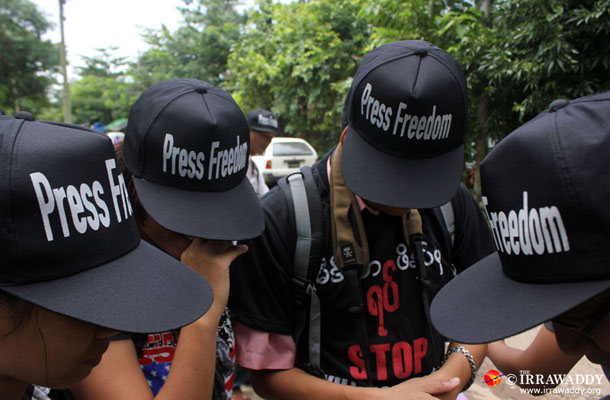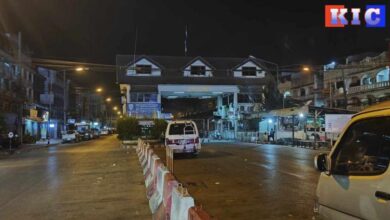Press Freedom – Journalist Arrests Undercut Burma Reforms

In a statement released to mark Press Freedom Day, Human Rights Watch condemned Burma’s government over the arrest and intimidation of journalists and called for new media laws to protect and promote a free press.
Phil Robertson, HRW’s deputy Asia director called for press freedom.
“International praise for expanding media freedoms in Burma has been undercut by arrests and intimidation of journalists,” he said, adding, “This serious backsliding raises concerns about the government’s commitment to a free press.”
HRW noted that Burma’s government had arrested at least eight journalists since December 2013. The reporters arrested are: Four journalists and the owner of the Unity Journal, who were arrested in January 2014 after running a feature on an alleged chemical weapons production plant in Magwe; Zaw Pe, a journalist from Democratic Voice of Burma who was given a year’s prison sentence on April 7 for allegedly trespassing and disturbing a civil servant while investigating corruption in the local department of education; Yay Khae, from Mizzima, who was arrested on April 25 for leading a demonstration of 15 journalists in a protest against the arrest and intimidation of Burma’s media; and Naw Khine Khine Aye Cho, from Daily Eleven, who was sentenced to three months prison after allegedly trespassing, engaging in criminal defamation and the use of obscene language while reporting on a corruption case.
Currently there are more than 100 human rights activists and journalists facing charges under the country’s draconian protest laws, which prohibit protest without official permission. Breaking the law, known as the Peaceful Assembly and Peaceful Procession law, can lead to a one year prison sentence and hefty fines.
The government is also under fire from journalists and human rights watchdogs for recently enacting two vaguely worded and wide-sweeping media laws – the Printers and Publishers Registration Law and the Media Law – which hand power to the government to revoke the registration of any publication if the publication insults religion, disturbs the rule of law or harms ethnic unity.
Mr. Robertson said that the new laws could usher in widespread repression of the media. “The new laws could allow the government to exert subtle control over the media through vague yet dangerous provisions… The switch from crude censorship to fines for crossing ambiguous lines will deny Burmese the press freedom they deserve.”
Mr. Robertson noted the importance of an independent press in Burma.
“World Press Freedom Day should be marked with the lifting of restrictions on journalists, not threats of new arrests or oppressive media laws,” Mr. Robertson said. “Only through a free press and government respect for journalists’ rights will democratic reform move forward.”
The media watchdog, Reporters Without Borders pointed out on its website that Burma’s much heralded reforms are not living up to their initial promise.
“The widespread euphoria generated by the successive amnesties of political prisoners in October 2011 and January 2012 has evaporated. The government is struggling to resolve sectarian and ethnic conflicts. With more freedom to speak out, civil society is complaining about the authorities.”
Burma was ranked 145 out of 180 countries on the Reporters Without Borders 2014 World Press Freedom Index.




